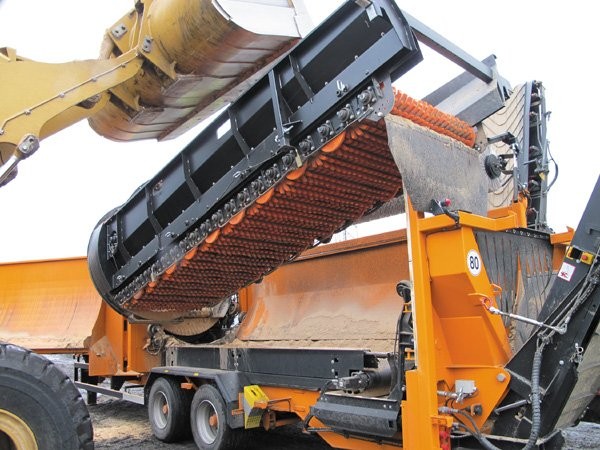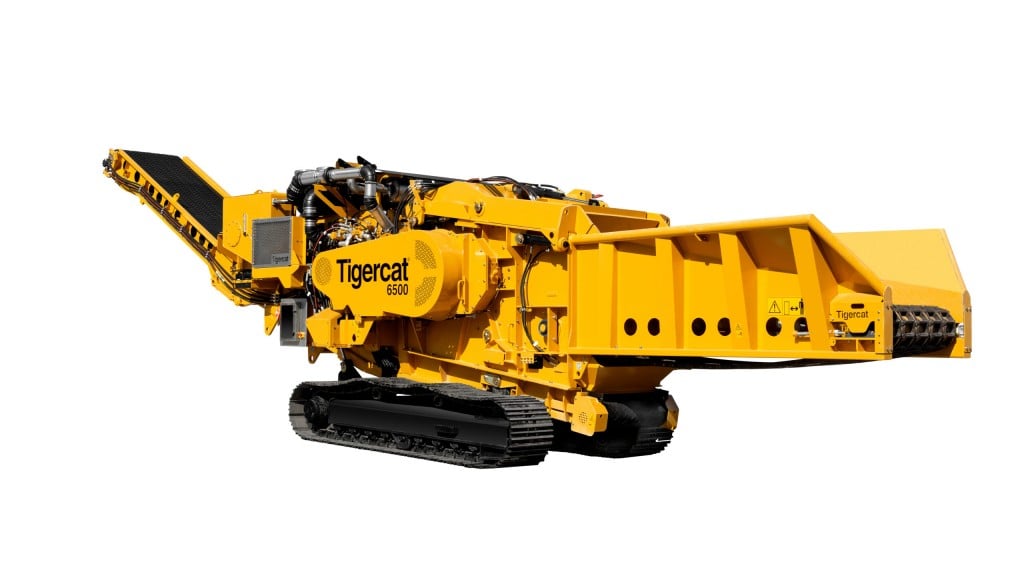Rising to the challenge of wet, sticky compost
New star screen insert passes the test at B.C. site

by Keith Barker
The methods for making nutrient-rich topsoil these days are not quite the same as they used to be. Traditionally, if you had a pile of debris from which you wished to extract organic fines, a very basic, flat deck screen would likely be used. Material would be dumped on top, and fines would be extracted as best as possible. Then came the trommel, which worked better. More recently, the star screen was introduced, which is engineered specifically for handling wet material that can plug up other types of screens.
Additionally, the material being handled these days is actually wetter and stickier than it has ever been. More food waste is being added to traditional organic material used to make compost, such as wood, leaves or grass. In many locations, another factor that must be considered is high moisture due to rainfall and humidity. When it comes to conventional trommel drums wrapped with wire cloth, they tend to plug up when dealing with wet, sticky material.
The Richmond Landfill
Ecowaste Industries Ltd. has been in the business of waste management for over thirty years, and owns and operates the Richmond Landfill, an approximately 800 acre processing and storage site located south of Vancouver, B.C. Ecowaste’s landfill accepts inert refuse, mainly from C&D sites, as well as a number of waste streams, including yard waste, and they have been composting on site for about 20 years. The site is also home to several leased operations run by various companies, including Yardworks, a western-Canada based wholesale commercial producer of bulk and bagged compost-based organic growing mediums and mulches (www.yardworkssupply.ca).
One of Yardwork’s challenges, when it comes to the task of producing high quality material for sale, is that it needs to be able to process wet and sticky materials to very high standards, efficiently, and based on demand. For many companies, to produce value-added material from this kind of feedstock, it has traditionally meant drying the material through the summer as best as possible. This means having quality material available for only a portion of the year. Or it would mean the purchase of a dedicated machine such as a star screen plant, which may only be productive during the wettest parts of the year. Neither of these are particularly cost-effective solutions.
This past June, Groundworx, the DoppstadtUS dealer for Western Canada, arranged to demo the new SM 720 star screen insert for Yardworks at the Richmond Landfill site. The SM 720 was built originally with a trommel drum insert, and has been proven for many years in this capacity. Now, Doppstadt has made available a star screen insert that can be switched for the trommel screen drum, on site, in only 20 to 30 minutes. The result is a versatile plant which can operate as both a trommel and star screen, and which is ideal for handling wet, sticky materials, such as those on the Richmond site.
“The material that has been stockpiled on the Richmond Landfill site is very wet, very sticky – almost like pudding,” explains Alf Mielty, B.C. region manager for Groundworx. “The challenge traditionally is that to process this type of material, they have to wait until mid-summer to even try, and even then it’s very difficult to do with any other type of screener. There is a very tight window of opportunity to screen this stuff and make it into anything that has value added.”
“The Doppstadt star screener is designed specifically to be able to handle dense, sticky material, and to separate out debris – rocks, sticks, etc.,” continues Mielty.
“Our June demonstration was very successful.” The SM 720 with star screen insert “did the job that could not be done by anything else.”
The technology
Doppstadt’s new star screen insert is specifically designed to convert the company’s model SM 720 and 720K trommel screens into a star screen. Users simply remove their existing trommel drum, replace it with the star screen insert, and resume operation. Doppstadt says their star screen insert is equally as effective as a dedicated standalone star screen, and it allows customers to extend the flexibility of their existing SM 720 trommel throughout any season and conditions.
“Wet, clumpy organic material with moisture content as high as 60 percent or more can continue to be processed, with throughput results as much as 50 percent higher than screening through a drum,” says Hugh Fagan, DoppstadtUS sales director.
According to Doppstadt, their star screen works on a revised principle, utilizing a softer urethane star design for extended life. The star shape on the shaft is elliptical, rather than conventionally round, which aids dramatically in shaft cleaning. Exclusive, alternate shaft speeds on the deck are also extremely effective in the stratification of material feed, and lead to a cleaner oversize product and increased production rates. When the standard trommel drum is removed from an SM 720, the star screen insert is set into the unit’s frame. The hydraulic circuit used to run the trommel drum now runs the stars in the screen bed. The machine is fed the same way, and produces a very clean screened product, with high rates of production. Plus, star speed adjustment is controlled on a drum speed dial, which allows operators to fine tune the finished product size to exactly what they require. Additionally, an optional infeed auger is used to keep material feeding onto the star bed uniformly.
The result, according to Doppstadt, is successful, efficient, high production in topsoil, mulch or compost applications, in wet, sticky conditions, without requiring an investment in an entirely new plant.
“This is a great option for customers to maintain full function of their trommel all year,” adds Fagan. “It eliminates the need for many operations to invest in a second machine for only partial use in certain conditions.”
Doppstadt’s range of SM screen plants use a four-cylinder Mercedes Diesel engine, with extremely low fuel consumption, and feature a very low feed hopper height (less than eight feet). These screeners also come with a swing out engine for easy, fast servicing, and quick-change punch plate drums. For transport, they can be moved on site with a loader and come with a hitch attachment. On the road, they are Transport Canada Approved, so it is fast and easy to obtain license plates.
“We’re the only company in the world that offers a machine that can convert between a star screen and a trommel screen in just 20 minutes,” says Martin Morgan, Doppstadt US area sales manager for the Southeast. “The successes we’ve had here in the States with the star screen insert, which are comparable with successes they’ve had in Europe, are the fact that it will produce more product than a traditional trommel screen.”
“Even if you’re in a typical application where you’re taking fines out of mulch, this star screen will typically produce faster than a trommel screen, and it allows us to put the 720 behind grinders with much higher horsepower,” continues Morgan.
“In stickier material, we’ve put the star screen insert into compost here in the U.S. with pretty high percent moisture, and it’s done real well.”
The star screen insert for SM 720 and 720K trommels is available throughout North America, and Doppstadt says they will be releasing a star screen insert compatible with their SM 617 and SM 726 trommels later in 2011.




